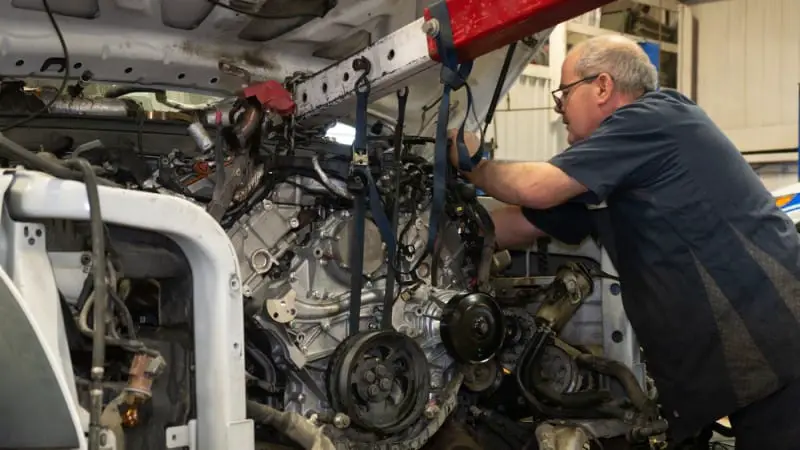Ever encountered an enigmatic buzz coming from your car while it’s idle? The unsettling noise might baffle and concern you, sparking questions about its origin.
Within this piece, we explore the myriad reasons behind this curious occurrence, emphasizing the urgency of swift resolution to sidestep potential issues.
Also Read: Driving With A Bad Oil Pressure Sensor: Any Real Risks?
What are the Common Causes of the Buzzing Sound when the car is off?
First, it’s important to know that a buzzing sound in your parked car can come from different places. Let’s look at some usual reasons:
-
Electrical Systems and Components
Modern vehicles are sophisticated, housing an array of electrical systems and components catering to multiple functionalities, including power locks, security systems, and infotainment features. Sometimes, when these systems encounter malfunctions or issues, they can emit buzzing sounds even when the car is turned off.
Pinpointing the source of these buzzing noises often revolves around identifying the responsible electrical system or component. Typically, malfunctioning relays, faulty solenoids, or a declining battery could be the culprits. By accurately diagnosing and repairing these electrical components, you can alleviate the buzzing issue and mitigate potential electrical problems in the future.
-
Fuel System Issues
Another probable cause for buzzing sounds can be found within the car’s fuel system. The fuel pump, entrusted with delivering fuel from the tank to the engine, might generate a buzzing noise due to several factors. Issues such as a clogged fuel filter, a weakening fuel pump, or excessive pressure within the system could contribute to this unsettling sound.
Neglecting these fuel system problems may result in poor engine performance or even stalling. Hence, it’s crucial to promptly address buzzing sounds associated with the fuel system to uphold the car’s overall health and performance.
-
Mechanical Vibrations
Mechanical vibrations could also be at the heart of the buzzing sounds in your vehicle, particularly when the engine is at rest. These vibrations might stem from loose or worn-out components, such as exhaust hangers, heat shields, or engine mounts. As the vehicle cools down after being driven, these components might contract, leading to buzzing noises as they settle.
Identifying the exact components causing the vibrations might pose a challenge, but careful inspection, along with tightening or replacing the affected parts, can resolve the issue and prevent future buzzing noises.
-
Aftermarket Modifications
In cases where a car has undergone aftermarket modifications, these changes could be the cause of the buzzing sound. Aftermarket alterations such as alarms, speakers, or lighting systems may not seamlessly integrate with the car’s original wiring, resulting in electrical interference and subsequent buzzing noises.
To address this, it’s vital to ensure that any aftermarket modifications are installed correctly and do not interfere with the existing electrical systems of the vehicle. Seeking assistance from a professional installer, if necessary, can rectify any issues and eliminate the buzzing sound.
Understanding the potential sources of buzzing sounds when your car is turned off is the first step in addressing and rectifying this issue. By being aware of the various systems and components that could be responsible, you can take the necessary steps to diagnose and resolve the problem, ensuring your car operates smoothly and efficiently without the unsettling buzzing noises.
Why is Your Car Making a Gurgling Sound After Being Turned Off? Discover Causes and Fixes!
A common occurrence puzzling many drivers is the emergence of a strange gurgling noise just after they’ve powered down their vehicles. This enigmatic sound is often associated with the movement of coolant or refrigerant within the car’s cooling system. Let’s delve deeper into the reasons behind this unusual noise and explore ways to address it.
Causes
The gurgling noise following the shutdown of a car is frequently linked to the movement of either coolant or refrigerant within the vehicle’s cooling mechanism. As the engine is turned off, the residual heat within the engine and the particular design of the cooling system can result in a temporary circulation of hot coolant or refrigerant, thereby causing the peculiar gurgling noise. This phenomenon is essentially a consequence of the transition from an operational engine to a resting state.
Fixes
Fortunately, the gurgling sound post-engine shutdown is usually harmless and does not necessarily indicate a severe issue with your vehicle. However, if the noise proves to be bothersome, here are a few simple steps you can take to potentially alleviate it:
-
Regular Maintenance
Ensuring the proper maintenance of your vehicle’s cooling system is crucial. Regularly monitoring the coolant levels and topping them up if necessary is a fundamental step. Additionally, check for any leaks within the cooling system to maintain its optimal functioning.
-
Proper Cool Down
One simple technique to potentially reduce the intensity of the gurgling noise is allowing the engine to idle for a minute before turning it off. This period enables the hot coolant to circulate and disperse some of the residual heat, potentially minimizing the intensity of the gurgling sound.
-
Consult a Mechanic
If the gurgling sound is exceptionally loud or if it’s accompanied by other issues within the cooling system, seeking advice from a qualified mechanic is advisable. They can thoroughly inspect the cooling system for any underlying problems and perform any necessary repairs or maintenance.
The gurgling sound is often considered a standard part of a car’s cooling system operation. Yet, if you observe any unusual symptoms or have concerns beyond this noise, professional assistance can be invaluable in guaranteeing your vehicle remains in optimal condition.
By acknowledging the causes and adopting these simple fixes, you can potentially mitigate the gurgling sound after turning off your car, ensuring a smoother and quieter experience at the end of every drive.
Why is a Diesel Car Making Noise When Turned Off? What Are the Causes and How Can You Fix It?

Causes
Diesel Knocking
One prevalent reason for post-turn-off noise in a diesel car is diesel knocking. This occurs due to the spontaneous ignition of fuel caused by high cylinder compression and temperature. After shutting down the engine, residual heat and pressure can lead to a sequence of small detonations, generating a knocking or pinging sound.
Turbocharger Residue
Many diesel vehicles incorporate turbochargers to enhance engine performance. When the engine halts, the turbocharger’s spinning elements might persist due to inertia, creating a whining or spinning noise as they gradually come to a stop.
Exhaust System Cooling
Diesel engines generate substantial heat during operation, affecting the entire exhaust system. Upon shutting off the car, the hot exhaust components cool down and contract, resulting in ticking or pinging noises.
- Injector Rattle
Fixes and Solutions
Diesel Knocking
To minimize diesel knocking, specific steps can be taken to manage fuel quality and engine performance:
- High-Quality Diesel Fuel: Utilize high-quality diesel fuel with the manufacturer’s recommended cetane rating for improved combustion and reduced knocking.
- Fuel Additives: Consider using additives designed to enhance combustion, contributing to smoother engine operation.
- Regular Maintenance: Engage in routine engine maintenance, including cleaning fuel injectors and ensuring proper timing adjustments, which can significantly reduce diesel knocking.
Turbocharger Residue
Reducing the spinning noise from the turbocharger can be achieved by adopting the following strategies:
- Idling Period: Allow the engine to idle for a brief period before shutting it off. This facilitates a gradual stop for the turbocharger components, reducing noise.
- Turbo Timer Installation: Consider installing a turbo timer, allowing the engine to run briefly after the car is turned off, ensuring a smoother shutdown for the turbocharger.
Exhaust System Cooling
To mitigate pinging sounds arising from the cooling exhaust system, focus on insulation and proper system maintenance:
- Proper Insulation: Ensure the exhaust system is well-insulated and securely fixed to minimize noises resulting from cooling components.
- Materials and Modifications: Use heat-resistant materials and avoid aftermarket modifications that may interfere with the exhaust layout, reducing potential noise issues.
Injector Rattle
To address injector-related noises and maintain their performance, follow these steps:
- Fuel Quality and Additives: Use high-quality diesel fuel and additives specifically designed to lubricate and maintain injector performance, reducing excessive rattling.
- Regular Inspection: Conduct regular inspection and maintenance of the fuel injection system, checking for worn or damaged injectors that could contribute to increased rattling.
Employing strategies related to fuel quality, maintenance, and thoughtful modifications can significantly contribute to a quieter and more refined diesel car experience, ensuring optimal performance and reduced noise levels.
FAQs About Buzzing Sound When Car is Off
Why is my car making a buzzing noise while off?
A buzzing noise in a parked car can stem from various sources. Common culprits include electrical systems or components malfunctioning, residual heat causing mechanical vibrations, or aftermarket modifications causing electrical interference. Identifying the specific cause might require a diagnostic assessment by a qualified professional to address the issue effectively.
Why is my car making a noise when it’s turned off?
If your car is producing a noise after being turned off, it could be due to residual heat causing mechanical components to contract or move slightly, creating sounds like ticking, pinging, or buzzing. Additionally, electrical systems or aftermarket modifications can also contribute to noises even when the car is not running.
Why is my car humming when not on?
A humming sound in a parked or turned-off car might be a result of residual vibrations from mechanical components cooling down after operation. These vibrations can lead to humming noises as parts settle. Furthermore, electrical components or aftermarket modifications might also contribute to a humming sound when the car is not running.
Why is my car ringing when it’s off?
A ringing or high-pitched sound when the car is turned off might result from various causes. These could include electrical interference due to aftermarket modifications, residual heat causing vibrations in cooling components, or issues within the vehicle’s electrical system. Identifying the precise cause often requires a professional assessment for appropriate resolution.
Conclusion
Experiencing a buzzing sound when your car is off can be both puzzling and unsettling. Understanding the potential causes—ranging from electrical malfunctions to fuel system issues, mechanical vibrations, or aftermarket modifications—empowers you to pinpoint and address the problem effectively. Whether resolving it yourself or with a professional’s help, prompt action ensures your vehicle’s overall health and performance. By tackling the buzzing sound swiftly, you pave the way for a quieter and more serene driving experience, enhancing your enjoyment on the road.




